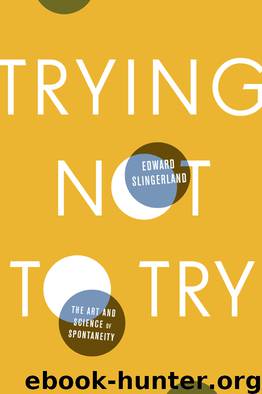Trying Not to Try by Edward Slingerland

Author:Edward Slingerland [Slingerland, Edward]
Language: eng
Format: epub
ISBN: 978-0-7704-3762-6
Publisher: Crown Publishing Group
Published: 2014-03-03T16:00:00+00:00
As with the Woodcarver Qing story, we have the process of “forgetting” taken to an extreme: not only the moral teachings and practices of the Confucians but also the body and perception itself. The idea here is that, if you are to successfully enter wu-wei, your focus should be on the world, not yourself. You have to forget everything—your ego, even your own body—so that you can be absorbed into the larger movement of Heaven’s Way.
Sounds great. The question, of course, is how do you lose yourself? How do you transfer control from the conscious mind to the body? More specifically, what the heck is Yan Hui doing when he goes away to “sit and forget”?
It’s possible that Zhuangzi dabbled in the sort of meditation and breathing techniques that seemed part of the Laozian strategy, and there are tantalizing hints that psychoactive substances were also involved. For instance, one of the early chapters of the book opens with a description of a certain Ziqi of South Wall, who is sitting in an odd, reclined posture, occasionally raising his head to the ceiling and taking deep breaths, looking “vacant and dazed, as if he had lost his companion.” Who is his “companion”? Your guess is as good as anyone’s, although most commentators think it refers to his body. Anyway, this guy has been doing intense meditation practice or serious drugs—or both. It gets weirder: he has an assistant, who apparently has been standing in front of him in attendance, watching or helping out in whatever’s been going on. (Helping him time his breathing? Ready to intervene if Ziqi starts to have a bad trip? Again, we don’t know.) Apparently the assistant is impressed: “Wow, what just happened? Is it really possible to make your body like dry wood, to make your mind like dead ashes? The person sitting there now is not the same person who was sitting there before.”
Ziqi confirms that he’s experienced a profound transformation. “My friend, that’s a very good question. Just now I lost myself. Can you comprehend that?” When asked to elaborate, he goes on for a long time trying to explain what he just experienced. There’s all this crazy stuff about the way the wind howls when it blows over the landscape, the pipings of Heaven and Earth, and questions about where the wind comes from. The experience has apparently done Ziqi some good, though, because we then immediately segue into the passage about the “great understanding” versus the “petty understanding”—we’re led to conclude that Ziqi’s experience has turned him into a sage.
The figure of Zhuangzi is associated historically with the southern state of Chu, which corresponds roughly to present-day Hubei and Hunan provinces, located in the center of present-day China. In the Warring States period, however, Chu was a border state, portrayed as an exotic, semibarbarian realm full of strange foods and wild animals. It is also traditionally associated with shamanistic practices, including astral projection trips and trances. Moreover, the stylistic transition as one
Download
This site does not store any files on its server. We only index and link to content provided by other sites. Please contact the content providers to delete copyright contents if any and email us, we'll remove relevant links or contents immediately.
The remains of the day by Kazuo Ishiguro(9000)
Tools of Titans by Timothy Ferriss(8396)
Giovanni's Room by James Baldwin(7346)
The Black Swan by Nassim Nicholas Taleb(7129)
Inner Engineering: A Yogi's Guide to Joy by Sadhguru(6796)
The Way of Zen by Alan W. Watts(6614)
The Power of Now: A Guide to Spiritual Enlightenment by Eckhart Tolle(5783)
Asking the Right Questions: A Guide to Critical Thinking by M. Neil Browne & Stuart M. Keeley(5775)
The Six Wives Of Henry VIII (WOMEN IN HISTORY) by Fraser Antonia(5515)
Astrophysics for People in a Hurry by Neil DeGrasse Tyson(5190)
Housekeeping by Marilynne Robinson(4449)
12 Rules for Life by Jordan B. Peterson(4305)
Ikigai by Héctor García & Francesc Miralles(4274)
Double Down (Diary of a Wimpy Kid Book 11) by Jeff Kinney(4272)
The Ethical Slut by Janet W. Hardy(4253)
Skin in the Game by Nassim Nicholas Taleb(4250)
The Art of Happiness by The Dalai Lama(4130)
Skin in the Game: Hidden Asymmetries in Daily Life by Nassim Nicholas Taleb(4007)
Walking by Henry David Thoreau(3962)
